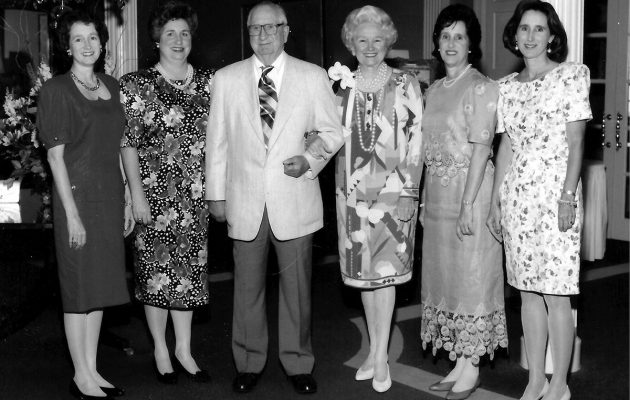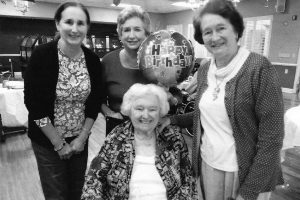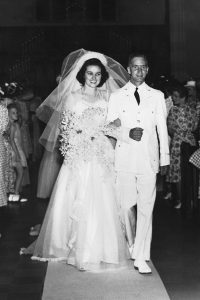The Way We Were: The Ulmer Girls

As Dorothy Ulmer Marsh, Elizabeth Ulmer Jolley and Frances Ulmer Howey wend their way through Riverside, Avondale, Ortega and Venetia on their daily activities, the three women embark on a journey through time that goes back many generations. The Ulmer “girls” – three of four sisters – pass Stockton Street, Stockton School, Stockton Park, all named after their illustrious and industrious ancestors.
Their Jacksonville roots go back nearly 150 years. In 1870, after the death of her husband, Mrs. William T. Stockton (Julia) moved to Jacksonville from Quincy, Florida with her children, Warwick, Julia, Mary Stuart, Telfair, Guy and John N.C., to open a boarding house in what had formerly been a “school for frail girls” on Forsyth and Main Streets.
The move would be a pivotal event in Jacksonville history. In the early 1900s, John Stockton, along with Charles Bettes and Henry Klutho, become the developers and designers of Ortega. Today, Stockton’s great-granddaughters explained that he wanted numerous parks in the area so that people would have access to the river and to nature, and every Ortega resident can testify to the glorious oaks and vistas available, thanks to the forethought of these remarkable men.
Likewise, Avondale and San Marco owe a debt to the Ulmer sisters’ great-uncle Telfair Stockton for his development of those areas in the 1920s. “It makes us proud that our family has been here for such a long time,” remarked Dorothy Marsh.
Elizabeth Jolley said that it is somewhat eerie to drive around and see where they played as children – the house on Main Street, the Stockton House on Riverside (where Villa Riva is now), their maternal grandparents (the Paynes) family home on Riverside by St. Vincent’s – all gone.
Even the Ulmer name has gone, since this was a family of girls who took their husbands’ names. “It is an interesting feeling having so many generations in one place. I appreciate the commitment of our grandparents and parents to the city,” said Elizabeth.
Conversation with the sisters is no linear event, and neither is this story. Yesterday and today blend together as they begin with a story about their grandmother, Jane Elizabeth (Bessie) Axtell Payne. At the age of age 13, while in school downtown, she asked permission to look up a word in the huge dictionary by the window so she could see the smoke of the fire which eventually devasted downtown Jacksonville in 1901. Dorothy said her grandmother took her cat and some silk stockings (which the Ulmer girls all find amusing) as the family vacated their home on First and Main.
First Cousin Lucy Tomlinson Wallace recalls spending time at “Nana’s” Riverside house with her cousins, and at the Paynes’ and the Stocktons’ beach houses every summer. “Atlantic Beach was just a sleepy little village. Dr. Campbell’s Drug Store is where Ragtime is now; there was Silver’s Pharmacy, Casey’s Grocery Store and a Swap Shop,” she said.
Laughing, Frances Howey recalled they would get snow cones and take child-sized metal shopping carts and race around Casey’s until they were chased out. “I still remember how it smells. We would collect, or according to Dorothy, snitch, empty bottles and sell them for two cents each then go to the 5 and Dime store,” she said. “Mother hated the boardwalk, but about once a summer she would take us. One time, Dorothy fell in the water, so that was Mother’s excuse to make us go home. Atlantic Beach was so quiet then – there was no traffic. Grandmother’s house was one block from the old Sea Horse Motel, now Ocean One.”
So much has changed, yet so much remains the same. The sisters sit in the same pew at Riverside Presbyterian Church where they sat as children; as do their local children and grandchildren, and the others when in town.
They see their brother-in-law, Walt Brinkman, at church every Sunday. Unfortunately, their older sister, Jean Brinkman, died of ALS in 2013. “ALS is the most horrible disease,” said Dorothy, who, with Walt, devotes hours to the ALS Advocacy Council in Jean’s honor. “Jean was only 70 – she worked at the public library, she taught special education, she helped found the Center for Adult Learning to promote continuing education scholarships. Losing Jean was unbelievable.” The Brinkmans have two sons, John and Kyle, and three grandsons.
The sisters were in Jean and Walt’s wedding in 1964 at Riverside Presbyterian, the same church where their parents, Elizabeth (Betty) Payne and Herman (Herdy) Ulmer, Jr., were married in 1942. Because of the war, Betty had to find local men to be groomsmen, and Frances related that her grandmother, Bessie Payne, was furious because it was August and there was no air conditioning at the church, and the groom only just arrived in Jacksonville from North Carolina the afternoon of the wedding.
Elizabeth’s father had been upset in 1925 when she moved her family from First Presbyterian Church to Riverside Presbyterian, yet connections to First Presbyterian remain since a stained-glass window there is dedicated to Dorothy Axtell, their grandmother Bessie’s sister, who died as a young child.
The Ulmer girls’ conversations are peppered with anecdotes about their interesting and lively family. Dorothy explained that in 1943, after graduating from Princeton, their father, Herdy, had rented an apartment so he could attend Harvard Law School. However, when the landlady found out Betty was expecting a baby, she said, “No children allowed,” so he went to the University of Florida since “they had always planned to come back to Jacksonville anyway.”
Jean was born in 1943, Elizabeth, 1947, Dorothy, 1950 and Frances, 1955. Because of their wide age span, Elizabeth said, “Mother put Jean on a plane to leave for college then on the same day turned around and took Frances to enroll in first grade at Ortega Elementary School.”
Of course, with four girls there were bound to be conflicts, but their age difference diffused most; their parents did not allow them to fuss and have disagreements when they were young. Living in the same close community – in familiar neighborhoods once occupied by their ancestors – is a comfort and a blessing and keeps the Ulmer girls close to their roots and close to each other.
When Dorothy was one month old, the family moved into their new home on Pirates Cove and lived next door to their father’s sister, Fannie (Frances) Conley and her husband and two daughters. Herdy called himself “The Chief of the Tribe.” Elizabeth said, “There was always something going on. It made it interesting; we were always going in different directions.” Dorothy said that it was a fun neighborhood. “People stayed forever. Pirates Cove was a marsh and Venetia Boulevard did not have one house on it.”
The girls attended Ortega Elementary, Lakeshore Junior High, then Bartram or Robert E. Lee High School, except Frances, who attended The Bolles School when it went co-ed. “Daddy didn’t have any sons to send to Bolles – he had gone there – so I went. He was a Trustee Emeritus for 40 years. I didn’t know what I was getting into. There were about 19 girls in a graduating class of 100.”
The sisters have great admiration and respect for their parents. Dorothy said, “My father had the biggest influence on me. He wouldn’t prepare my income taxes until I told him how much I made on the side tutoring.”
Frances agreed. “He had such an honorable code of ethics about him; he was an honest gentleman,” she said. “Daddy was the boss. We couldn’t spend the night out on Saturday nights because we had to be at Sunday school on Sunday morning.”
Their mother, who modeled in department stores and participated in water ballets, left them with the legacy of stunning blue eyes, as well as many life lessons, including “Take the high road. No good bird dirties its nest. Pretty is as pretty does” and, their dad’s favorite, “Don’t let them know where you keep your goat.”
Herdy and Betty set a high standard for their daughters and grandchildren. Frances explained, “They taught us to give back. We were so lucky to have our parents for a long time. They were married 66 years.” The women laughed about the fact that their father didn’t cook or do anything “domestic” and neither of their parents would touch a microwave.
Their father worked long hours at the law firm of Ulmer, Murchison, Ashby and Taylor but Frances remembered, “He would come home to put me to bed, then go back to work or to the church or to Bolles for a meeting.” Dorothy added, “He would take Frances to the barber shop with him or to Jake’s Newsstand for a Co-Cola and a comic book. He would take us to Memorial Park to roller skate and told the best stories about the street car stopping in Ortega and many family stories, too. We had wonderful summer vacations. One year we followed our great-great grandfather, Col. William Stockton’s Civil War journey, going to battlefields and learning so much.”
Love of history must be genetic. “My son, Edward Marsh, participates in civil war re-enactments at Olustee,” said Dorothy. “When he was about 14 or 15 we took him there and he said it was better than Disney World.” Dorothy’s husband, Jim Marsh, passed on in 1998.
Frances’s husband, Bill Howey, is a Civil War buff as well. Family history and artifacts pop up in conversations at every turn: the receipt for Herdy and Betty’s five-day honeymoon trip to The Cloister ($14 a night); his trunk from World War II addressed to “Herman Ulmer, Ortega, Florida”; vintage photographs of the beautiful family homes on Riverside Avenue with horses and buggies, generations of people and places which hold precious memories and valuable Florida historical information.
Frances and Bill met when he was a lieutenant in the Marines, stationed at Cecil Field, and Frances and Dorothy went to a Halloween party at Ca’ d’ Oro Villas on Timuquana Road where he lived in 1977. She said, “It was the first place I wanted to live after college; Dorothy lived there too. No kids, no pets, full of Navy pilots!”
They have three daughters, Sarah, Jean and Julia, and six grandchildren – two of whom are at Riverside Presbyterian Day School where Julia is director of the Riverside in the Afternoon program. The Howeys recently celebrated their 40th anniversary and, although Bill is still working, find time to travel and visit their daughters, walk three times a week, go to yoga and help care for their local grandchildren, who attend RPDS, of course.
Elizabeth, and her recently deceased husband, Warren Jolley, met at Lee High School, Betty Ulmer’s alma mater, but didn’t start dating until after graduating from the University of Florida. They have two daughters, Susan and Beth, and three grandchildren, all of whom live in Atlanta and Virginia.
The sisters, all educators, share a love of the book, “A Land Remembered,” enjoy exploring the history and contributions of their family, are on the “same page politically,” enjoy getting together for holidays, cooking and being able to call on each other. “I don’t know what I’d do without my sisters,” said Elizabeth, who teaches at St. John’s Presbyterian where Dorothy and Frances had taught previously, and lives in Presbyterian House. She is an avid and talented seamstress.
In addition to her work with ALS Advocacy Council, Dorothy belongs to a book club, the Watsonia Garden Club, the Mexican Train Domino Club and other social clubs since her retirement from teaching school.
By Peggy Harrell Jennings
Resident Community News








